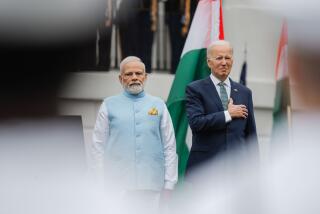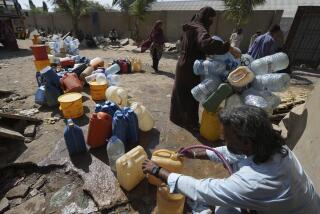Meeting to Address Latin Development : Economics: A U.N. report puts the cost of “environmentally sustainable” progress at up to $10 billion a year.
- Share via
SANTIAGO, Chile — Latin America may need to invest $10 billion a year to make sure that economic development is “environmentally sustainable,” according to a United Nations study.
The document says countries of the region are increasingly aware that environmental damage, caused by both underdevelopment and development, can jeopardize future progress.
“We have now left behind us the controversies of bygone years in which it was claimed that there is some kind of conflict between concern for the environment and the objective of development,” says the study by the Santiago-based U.N. Economic Commission for Latin America and the Caribbean.
Titled “Sustainable Development: Changing Production Patterns, Social Equity and the Environment,” the document was prepared for a three-day meeting that begins today in Mexico City on Latin American environment and development. The meeting, to be attended by cabinet ministers and other government officials from throughout the region, is part of worldwide preparations for the United Nations Conference on Environment and Development to be held next year in Rio de Janeiro.
Among proposals from the U.N. study to be discussed at the Mexico meeting:
* Formulating a Latin American strategy aimed at the widespread introduction of “environmentally sound technologies.” Research is needed to identify trade and institutional barriers that block access to such technologies developed abroad.
* Strengthening the capacity of Latin American countries to develop their own environmentally sound technologies. New funds should be applied to research and development programs, training of scientists and professionals and establishment of pilot plants and demonstration centers, the study proposes.
* Implementing new trade strategies to reduce environmental degradation. Goals should include relieving pressure for bulk exports of raw materials and not accepting import products that are banned in countries of origin for environmental reasons.
* Devise a regional strategy to protect and regulate trade in genetic material derived from the region’s natural bio-diversity. “Bio-diversity, as an economically valuable ecological resource, constitutes a ‘tradable good’ which belongs to the countries that possess it,” the study says.
The U.N. study stresses the need for new foreign financing, in soft credits and grants, and proposes creation of a special regional environmental fund to fill financing gaps.
It says the region already has begun investing around $2 billion a year in goods and equipment designed to prevent or control environmental problems caused by economic production, mainly manufacturing and mining. “If the need to redress past errors is taken into consideration as well, then it would not be surprising if the amount of financing needed to make the region’s development (environmentally) sustainable bordered on $10 billion per year,” the study estimates.
The U.N. commission declares in the study that environmental concerns are legitimate even when they conflict with development goals. “This is particularly true in Latin America and the Caribbean, whose economies are based fundamentally on the exploitation of natural resources, many of them vulnerable to irreversible degradation,” the study says.
Gert Rosenthal, secretary general of the U.N. Economic Commission for Latin America and the Caribbean, said the Mexico meeting will explore ways to integrate economic expansion and environmental protection.
“This is a vital subject, not only for those who want a cleaner and prettier planet, but for everyone who wants the economic development of Latin America,” Rosenthal said in presenting the study at a recent news conference.
Horacio Flores de la Pena, Mexican ambassador to Chile, said the study takes a practical approach to Latin American problems. “It gives the diagnosis and also the medicine, something that is unusual in documents of this kind,” Flores said at the news conference.
But he predicted that it will not be easy to break what he called the vicious circle of Latin American underdevelopment and environmental degradation.
“The poorest and weakest sectors of Latin American society live in the most deteriorated places, and it can’t be corrected because they are very poor,” he said.
The study observes that low-income groups often must give priority to immediate consumption over savings, so they don’t think about saving the environment. “In such cases, conservation policies must be incorporated into an overall poverty-fighting policy,” the study recommends.
More to Read
Sign up for Essential California
The most important California stories and recommendations in your inbox every morning.
You may occasionally receive promotional content from the Los Angeles Times.













